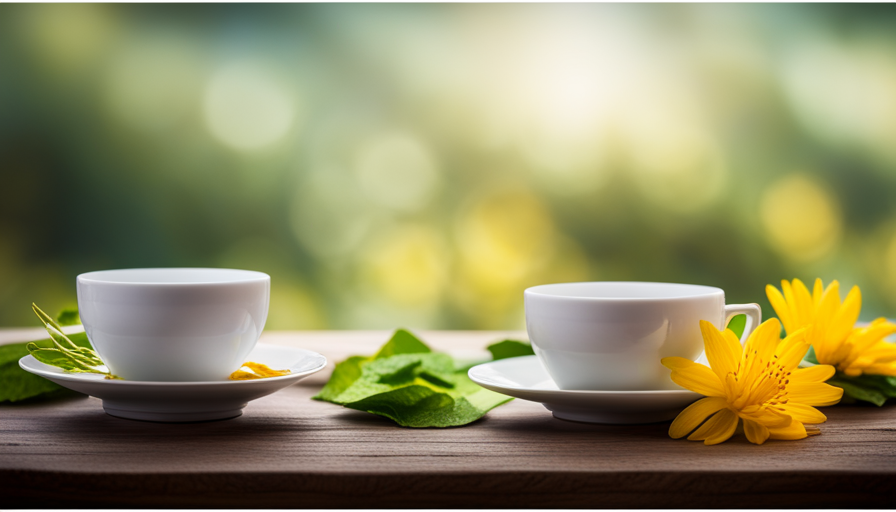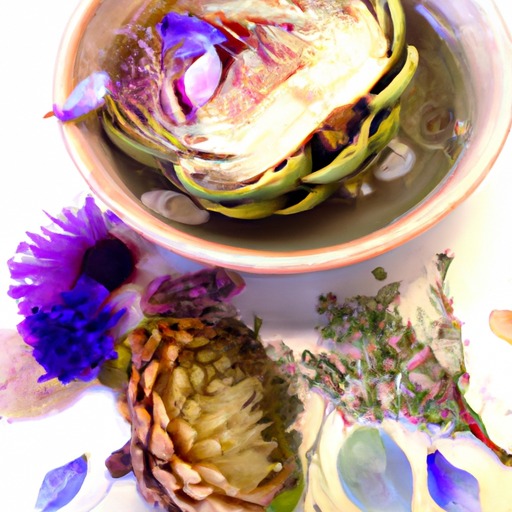Did you know that approximately 30% of adults suffer from insomnia? It’s a staggering statistic that highlights the widespread nature of this sleep disorder.
If you’re one of the many individuals struggling to get a good night’s sleep, you may have turned to herbal teas as a natural remedy. Two popular options for insomnia relief are linden tea and passion flower tea. But which one is the best choice?
In this article, we’ll explore the benefits of herbal teas for promoting sleep and compare the effects of linden and passion flower tea on insomnia. We’ll delve into how each tea works to induce sleep and discuss other natural remedies that can complement their effects. Additionally, we’ll provide tips for creating a bedtime routine and optimizing your sleep environment.
If you’re tired of tossing and turning night after night, read on to discover which tea may be the key to a peaceful slumber.
Key Takeaways
- Both linden and passion flower tea have calming and sedative properties that promote sleep and can be beneficial for insomnia.
- Passion flower tea may have stronger sedative properties due to its ability to increase GABA levels in the brain.
- Linden tea offers additional health benefits such as reducing inflammation, soothing digestive issues, and boosting the immune system.
- When choosing a tea for insomnia, consider personal taste preferences and any sensitivities, and look for teas formulated with linden or passion flower.
Understanding Insomnia and its Effects on Sleep Quality
Having trouble sleeping? Learn more about insomnia and how it affects your sleep quality. Insomnia is a common sleep disorder characterized by difficulty falling asleep, staying asleep, or experiencing non-restorative sleep. It can lead to daytime fatigue, mood disturbances, and impaired cognitive function. Understanding sleep disorders is crucial in finding effective solutions to improve sleep quality.
One major factor that can contribute to insomnia is stress. When we’re stressed, our bodies release stress hormones like cortisol, which can interfere with our ability to fall asleep and stay asleep. Chronic stress can disrupt our sleep-wake cycle and make it difficult for us to achieve deep, restorative sleep. As a result, it’s important to find ways to manage and reduce stress in order to promote better sleep.
Now, let’s transition to discussing the benefits of herbal teas for promoting sleep. These teas, such as linden and passion flower, have been used for centuries for their calming and sedative properties. They can help relax the body and mind, making it easier to fall asleep and stay asleep throughout the night. So, if you’re looking for natural remedies to improve your sleep, keep reading to learn more about the benefits of herbal teas for insomnia.
The Benefits of Herbal Teas for Promoting Sleep
To promote a restful night’s sleep, herbal infusions can provide a myriad of benefits. One popular option is chamomile tea, known for its calming properties. Chamomile contains an antioxidant called apigenin, which binds to specific receptors in the brain that help reduce anxiety and initiate sleep. Studies have shown that chamomile tea can improve sleep quality and reduce insomnia symptoms.
Another herbal tea that has been found effective for promoting sleep is valerian tea. Valerian root contains compounds that interact with neurotransmitters in the brain, promoting relaxation and reducing anxiety. Research has shown that valerian tea can help improve sleep latency, duration, and overall sleep quality.
To help you visualize the benefits of these herbal teas, here is a table comparing the effects of chamomile tea and valerian tea on insomnia:
| Herbal Tea | Benefits for Insomnia |
|---|---|
| Chamomile | Reduces anxiety, improves sleep quality |
| Valerian | Promotes relaxation, improves sleep duration |
Based on this table, both chamomile and valerian tea have their own unique benefits for insomnia. In the next section, we will compare the effects of linden and passion flower tea on insomnia, further exploring the options for a restful night’s sleep.
Comparing the Effects of Linden and Passion Flower Tea on Insomnia
If you’re looking for more options to promote a restful night’s sleep, let’s now compare how linden and passion flower can help you relax and improve your sleep.
Both linden and passion flower tea have been used for centuries to treat insomnia and promote relaxation. However, it’s important to note that the effectiveness of these teas can vary from person to person.
When comparing the effectiveness of linden and passion flower tea for insomnia, some studies suggest that passion flower may have stronger sedative properties. It contains compounds that can increase the levels of GABA, a neurotransmitter that helps regulate sleep. On the other hand, linden tea has calming properties that can help reduce anxiety and promote relaxation, which in turn can aid in falling asleep.
It’s also important to consider potential side effects when choosing between linden and passion flower tea. While both teas are generally safe for consumption, some individuals may experience mild allergic reactions or digestive issues. It’s always a good idea to consult with a healthcare professional before incorporating herbal teas into your sleep routine.
Both linden and passion flower tea have the potential to improve sleep and promote relaxation. However, it may be beneficial to try both teas and see which one works best for you.
In the next section, we will explore how linden tea specifically works to promote sleep.
Linden Tea: How it Works to Promote Sleep
Explore how linden tea works its magic to help you achieve a peaceful and restful night’s sleep. Linden tea, derived from the flowers of the linden tree, has been used for centuries as a natural remedy for insomnia. Its calming properties can promote relaxation and alleviate anxiety, making it an excellent choice for those struggling with sleeplessness.
To fully enjoy the benefits of linden tea, follow these steps:
-
Health benefits of linden tea beyond promoting sleep: Apart from its ability to induce sleep, linden tea offers a range of other health benefits. It can help reduce inflammation, soothe digestive issues, and boost the immune system. Its antioxidant properties may also contribute to overall well-being.
-
How to prepare and brew linden tea for maximum effectiveness: Start by boiling water and adding a tablespoon of dried linden flowers. Let it steep for about 10 minutes to allow the active compounds to infuse into the water. Strain the tea and enjoy it warm before bedtime.
-
Transition to passion flower tea: Now that we’ve explored the wonders of linden tea, let’s delve into the next herbal remedy for insomnia, passion flower tea, and discover how it works to induce sleep.
Passion Flower Tea: How it Works to Induce Sleep
Now let’s uncover the enchanting qualities of passion flower tea and how it weaves a soothing spell to lull you into a peaceful slumber. Passion flower tea has long been used for its calming properties and is known for its ability to induce relaxation and promote sleep.
The plant contains various compounds, including flavonoids and alkaloids, that have a sedative effect on the nervous system. These compounds work by increasing the levels of gamma-aminobutyric acid (GABA) in the brain, which helps to reduce anxiety and promote a sense of calm.
Passion flower tea is particularly effective at calming the nervous system, making it an excellent choice for those struggling with insomnia. It can help to alleviate symptoms such as restlessness, racing thoughts, and general anxiety, allowing you to unwind and drift off to sleep more easily.
Additionally, passion flower tea has been found to improve the quality of sleep, leading to a more restful night and a refreshed feeling in the morning.
When considering the right tea for insomnia, it’s important to take into account individual preferences and sensitivities. However, passion flower tea’s reputation for inducing relaxation and calming the nervous system makes it a compelling option to explore.
Considerations for Choosing the Right Tea for Insomnia
When choosing the perfect brew to help you sleep, it’s important to consider various factors such as your personal taste preferences and any sensitivities you may have. Here are some key considerations to keep in mind when choosing a tea for insomnia:
-
Herbal Blend: Look for teas specifically formulated to promote sleep, such as those containing linden or passion flower. These herbs have been traditionally used for their calming properties and can help relax the body and mind.
-
Quality and Purity: Opt for organic teas that are free from pesticides and other harmful chemicals. This ensures that you’re getting the purest form of the herbs and maximizing their sleep-inducing benefits.
-
Caffeine Content: Avoid teas that contain caffeine, as it can interfere with your ability to fall asleep. Instead, opt for caffeine-free options like herbal teas or decaffeinated versions.
-
Taste and Aroma: Consider your personal taste preferences when choosing a tea for insomnia. Experiment with different flavors and aromas to find one that you enjoy, as this can enhance the overall relaxation experience.
By taking these considerations into account, you can choose a tea that not only helps you sleep but also suits your individual preferences. However, there are also other natural remedies for insomnia that can complement the use of tea in promoting better sleep quality and duration.
Other Natural Remedies for Insomnia
Consider incorporating other natural remedies into your bedtime routine to help you achieve a peaceful and restful night’s sleep. While linden and passion flower tea are known for their calming properties, there are several other natural remedies that can also aid in managing insomnia.
One effective natural remedy for anxiety and stress relief is aromatherapy. Essential oils like lavender, chamomile, and valerian have been shown to promote relaxation and improve sleep quality. You can diffuse these oils in your bedroom or add a few drops to a warm bath before bedtime.
In addition to herbal remedies, the role of diet and exercise should not be overlooked when it comes to promoting better sleep quality. Avoiding caffeine and heavy meals before bed can help prevent sleep disturbances. Regular exercise during the day can also help reduce anxiety and promote a more restful sleep at night.
To further improve your sleep routine, consider creating a bedtime routine that incorporates these natural remedies. This could include practicing relaxation techniques, such as deep breathing or meditation, before bed. By incorporating these natural remedies and creating a consistent bedtime routine, you can improve your chances of achieving a good night’s sleep.
Creating a Bedtime Routine for Improved Sleep
Incorporating a consistent bedtime routine infused with calming scents, gentle stretches, and soothing music can transport you to a tranquil state, paving the way for a night of deep and restorative sleep. Creating a bedtime routine is essential for improving sleep quality and ensuring a restful night.
Here are three key elements to consider when developing your own routine:
-
Calming Scents: Incorporate aromatherapy into your routine by using essential oils such as lavender or chamomile. These scents have been shown to promote relaxation and reduce anxiety, making it easier to fall asleep.
-
Gentle Stretches: Engaging in gentle stretching exercises before bed can help to release tension in your muscles and promote relaxation. Consider incorporating yoga or simple stretching routines into your bedtime routine to prepare your body for sleep.
-
Soothing Music: Listening to calming and soothing music can help to relax your mind and create a peaceful atmosphere. Choose music that you find soothing and create a playlist that you can listen to before bed.
By incorporating these elements into your bedtime routine, you can effectively wind down before bed and prepare your body and mind for a restful night’s sleep.
Transitioning into the subsequent section about ‘tips for optimal sleep environment’, it’s important to create an environment that promotes sleep.
Tips for Optimal Sleep Environment
To create an ideal sleep environment, make sure your bedroom is cool, dark, and free from distractions. Your bedroom should be a sanctuary dedicated solely to rest and relaxation. One important factor to consider is the impact of technology on sleep quality. The blue light emitted by electronic devices can interfere with your body’s natural sleep-wake cycle, making it harder to fall asleep and stay asleep. It is best to avoid using electronic devices for at least an hour before bedtime. Additionally, consider investing in blackout curtains or an eye mask to block out any unwanted light. Keep the temperature in your bedroom on the cooler side, as a slightly cooler room promotes better sleep. Lastly, eliminate any distractions, such as noise or clutter, that may disrupt your sleep. By creating a sleep-friendly bedroom, you can improve your chances of getting a restful night’s sleep. Transitioning to the next section, seeking professional help for persistent insomnia, can provide further guidance for those struggling with sleep issues.
Seeking Professional Help for Persistent Insomnia
When facing persistent sleep problems, seeking professional help for insomnia can provide valuable guidance and support. While self-help techniques can be effective for some individuals, it’s important to recognize that persistent insomnia may require professional therapy to address underlying issues and develop a comprehensive treatment plan.
Here are three reasons why seeking professional help for insomnia is beneficial:
-
Expertise: Sleep professionals, such as sleep psychologists or therapists, have specialized knowledge and training in treating sleep disorders. They can assess the root causes of insomnia, such as anxiety or depression, and tailor treatment strategies accordingly. Their expertise ensures that you receive evidence-based care that’s tailored to your specific needs.
-
Comprehensive Evaluation: Professionals conduct thorough evaluations to identify factors contributing to your insomnia. They may use sleep diaries, questionnaires, or even overnight sleep studies to gather objective data. This comprehensive evaluation helps uncover any underlying medical conditions or sleep disorders that may be exacerbating your insomnia.
-
Individualized Treatment: Professional help allows for the development of a personalized treatment plan. This may include a combination of cognitive-behavioral therapy for insomnia (CBT-I), sleep hygiene education, relaxation techniques, and medication management if necessary. Professionals can monitor your progress and make adjustments to the treatment plan as needed.
Seeking professional help for persistent insomnia can provide the expertise, comprehensive evaluation, and individualized treatment necessary to address your sleep problems effectively. While self-help techniques may be helpful in some cases, professional guidance can greatly improve your chances of achieving restful sleep.
Frequently Asked Questions
Are there any potential side effects of drinking linden or passion flower tea for insomnia?
There may be potential risks and long-term effects associated with drinking linden or passion flower tea for insomnia. It’s important to note that both teas can have sedative effects, which can help with sleep.
However, some individuals may experience allergic reactions or interactions with certain medications. Additionally, long-term use of these teas could potentially lead to dependency or tolerance.
It’s always best to consult with a healthcare professional before incorporating any herbal remedies for insomnia.
Can linden or passion flower tea be used in conjunction with other herbal remedies for better sleep?
Combining linden or passion flower tea with other herbal remedies can indeed enhance sleep quality. These teas, known for their calming properties, can be complemented by herbs like chamomile or valerian root. The synergistic effects promote relaxation and deeper sleep.
As for the time it takes for these teas to take effect on insomnia, it varies from individual to individual. However, many people report feeling more relaxed and sleepy within 30 minutes to an hour after consuming the tea.
What is the recommended dosage of linden or passion flower tea for insomnia?
The recommended dosage of linden or passion flower tea for insomnia varies depending on the individual and the severity of their symptoms. It’s generally suggested to start with a small amount, such as one cup before bed, and gradually increase if necessary. However, it’s important to note that these teas may cause drowsiness and potential side effects such as dizziness or upset stomach.
It’s always best to consult with a healthcare professional before using herbal remedies for insomnia.
Can linden or passion flower tea be used by pregnant or breastfeeding women for insomnia?
During pregnancy and breastfeeding, it’s important to prioritize the safety of both the mother and the baby. While linden and passion flower tea have been traditionally used for insomnia, there’s limited research on their safety during this period.
It’s advisable to consult with a healthcare professional before consuming these teas. They can provide guidance on the potential benefits and risks associated with using linden and passion flower tea for insomnia during pregnancy and breastfeeding.
Are there any interactions between linden or passion flower tea and medications commonly used for insomnia?
There may be potential interactions between linden or passion flower tea and medications commonly used for insomnia. It’s important to consult with a healthcare professional or pharmacist before combining these teas with any medication.
Additionally, the effectiveness comparison of linden and passion flower tea for insomnia is still being studied, and individual experiences may vary. It’s advisable to gather more evidence-based information and seek professional guidance for the best approach to managing insomnia.
Conclusion
In conclusion, both linden and passion flower tea have shown potential in promoting better sleep and managing insomnia.
While linden tea works by calming the nervous system and reducing anxiety, passion flower tea has sedative properties that aid in inducing sleep.
However, it’s important to remember that natural remedies alone may not be enough to treat persistent insomnia.
Building a consistent bedtime routine, creating an optimal sleep environment, and seeking professional help when needed are crucial steps towards improving sleep quality.
So, why not give these herbal teas a try and see if they can help you drift off into dreamland?










